Dear Friends
Thirty Christmases. That’s how many it’s been on Alderspring Ranch.
1993: It was just Caryl and I that first year, huddled around a tree in our 350 square foot tin shack we called home. Without the wood stove that often glowed red on a frigid and brittle winter night the little plumbing we had would freeze (it often did anyway). At that time we were childless. To make up for it (or, perhaps train for a God-only-knew storm of girls we would soon start having), we had two dogs that would pile under or on our bed at night, depending on the temperature inside; an Aussie named Maggie and a husky named Skeena.
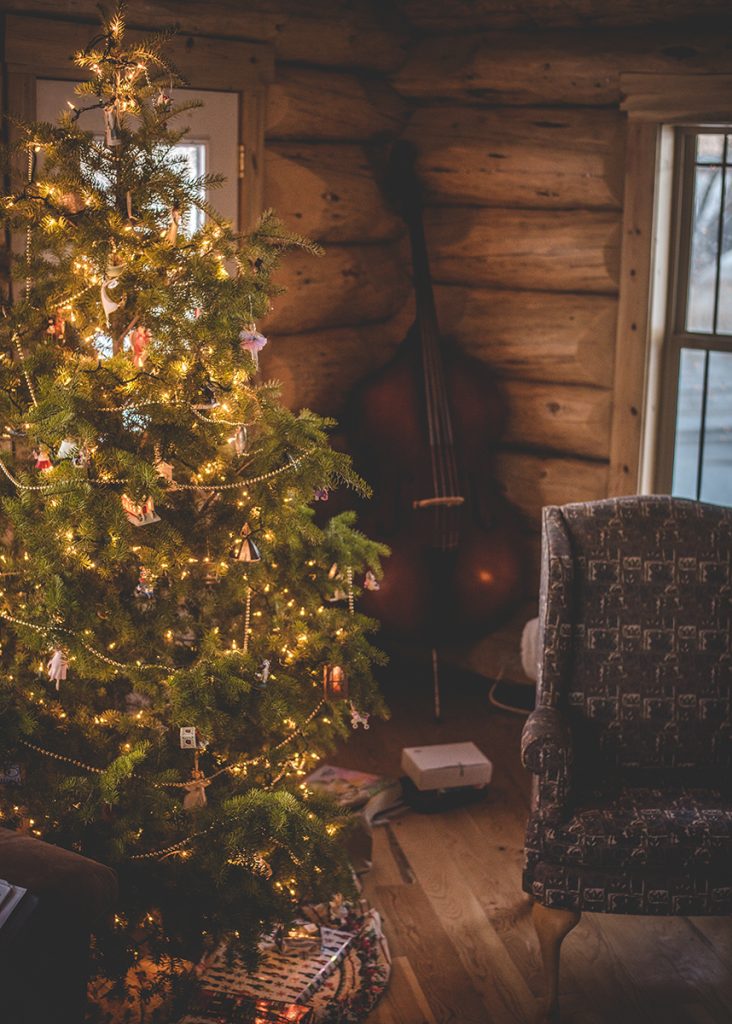
The house we live in now is bigger than the tin shack, but the tree is about the same.
It was the first home that was truly ours. Just a tin-side to be sure, but the dirt underneath belonged to us too, all 145 acres of it. Before that, we never owned anything in our lives except what we could stuff in a 70’s ford sedan and rust-bucket Toyota Land Cruiser (you could get an immediate read on road conditions through several handy holes next to the pedals). In addition to dirt, we had livestock: seven cows were ours out on the big meadows along percolating under ice Agency Creek; the rest were the former owner’s—Ron and Frances Alder. The pair of septuagenarians still lived in a house (we asked them to stay despite them selling) just a few hundred feet from ours that wasn’t that much better than our tin shack. They’d been ranching on this place since the early 1940s, and although they owned it and the cows on it, they had little else besides a mare named Sally and a dog named Freckles.
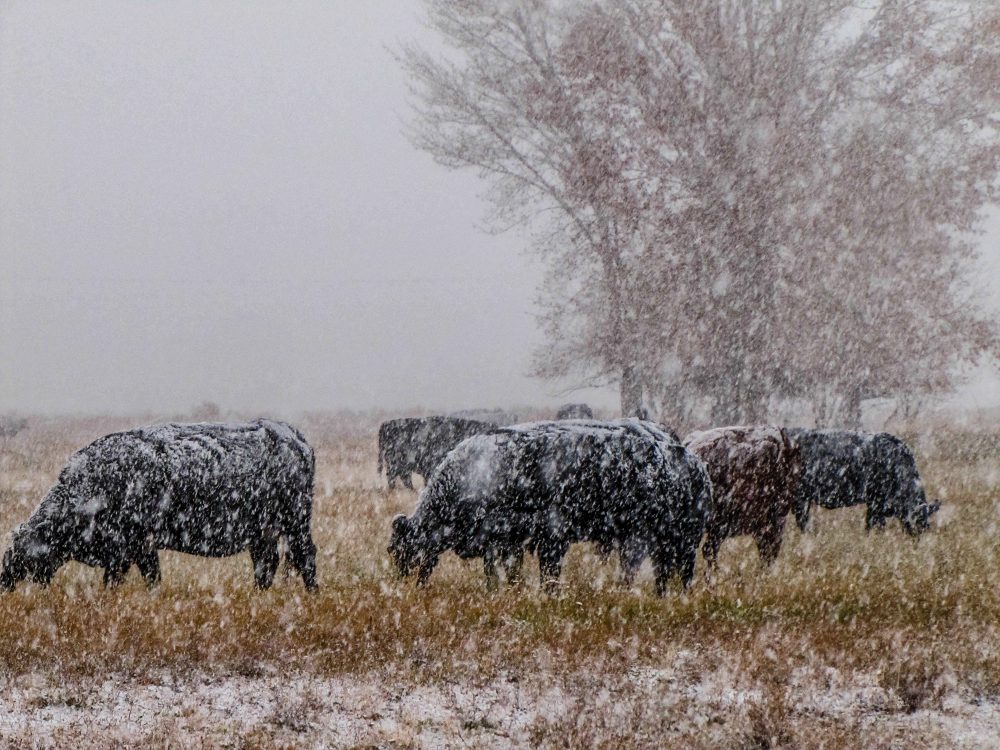
Those first years were pretty lean. And they weren’t any fatter after the kids started coming. All girls they were. One after another. As I write this, it’s hard to coax memories from those dusty files. I think the murk in those memories is residue from a combination of sleeplessness and stress. Don’t get me wrong; we were happy in those days, but were upside down, money wise, and wondering how we could possibly make the next year’s ends meet.
Christmas was more about the people than the presents then. So we simply focused on that (still do, actually).
We had been on the place for a few years now, and Caryl and I were unknowingly sending the tendrils of roots from our hearts into that of the land. The place—the grass, creek, cows and the wild animals—even the unpeopled wild Divide country to the east were all getting a hold on us. As I made my way through the low drifts of snow on the way back from the barn on this particularly cold winter night, the steady wind cut like a knife through the open collar of my chore coat. It was that dreaded east wind. It had spilled over the low point in the Continental Divide—Lemhi Pass– up the creek from us. It meant that subzero air had filled Montana’s Horse Prairie on the other side, and now, the icy bathtub was overflowing into Idaho. I looked up to the stars above the high divide; they stood stubborn, unwavering in the wind, crystal clear pinpricks. It felt weirdly ironic to me that these balls of fire weren’t yielding any heat.
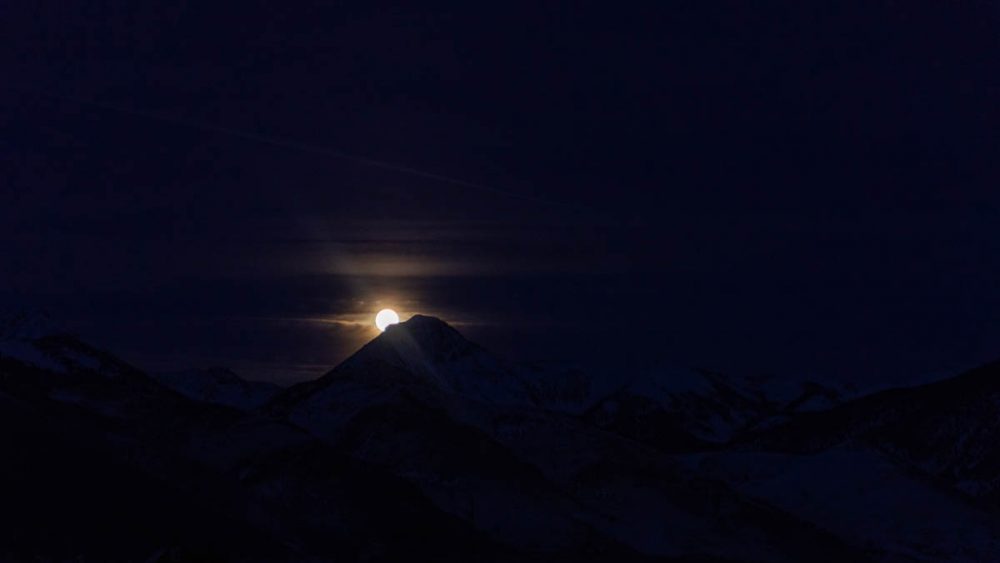
I slipped in around tomorrow’s stash of cow hay, stacked high in the back of my 3-on-the-tree ancient Ford pickup parked right against the house. It had an easy starting 300-6 inline that would turn over despite the cold, and I smiled at the fact that we had finally outsmarted the wild herd of bull elk that robbed from our feed truck every night. We parked it by our kitchen/living room window. Skeena lay nestled deep down in the hay like every self-respecting Siberian would on a subzero night. He looked up as I went by in the starlight, gave one affirming wag, and went back to his post of head tucked under tail, no interest in the wood-heat hot house I was about to enter.
As I climbed up onto the back steps, the wind blew over the thin tin walls and singlepane windows and shook the shack. I swung open the metal door, clutching it so the wind wouldn’t rip it out of hand, and was met a blast of wood-stove heat and four happy girls. The oldest were 7 and 6, and next ones were 4 and 3. Their youngest sister was just 3 months old, and in Caryl’s arms in the rocking chair, nursing. The house was warm and cozy. Despite the low howl of icy breeze outside, there was the relative quiet of Christmas music inside and soon, the ornaments on the small Douglas-fir branches hung still after the wind tunnel of doorway was secured. We had found the tree up nearby Cow Creek in a thicket of hundreds of new trees, and completed its festive glory with ornaments and lights from the local hardware store and thrift shop.
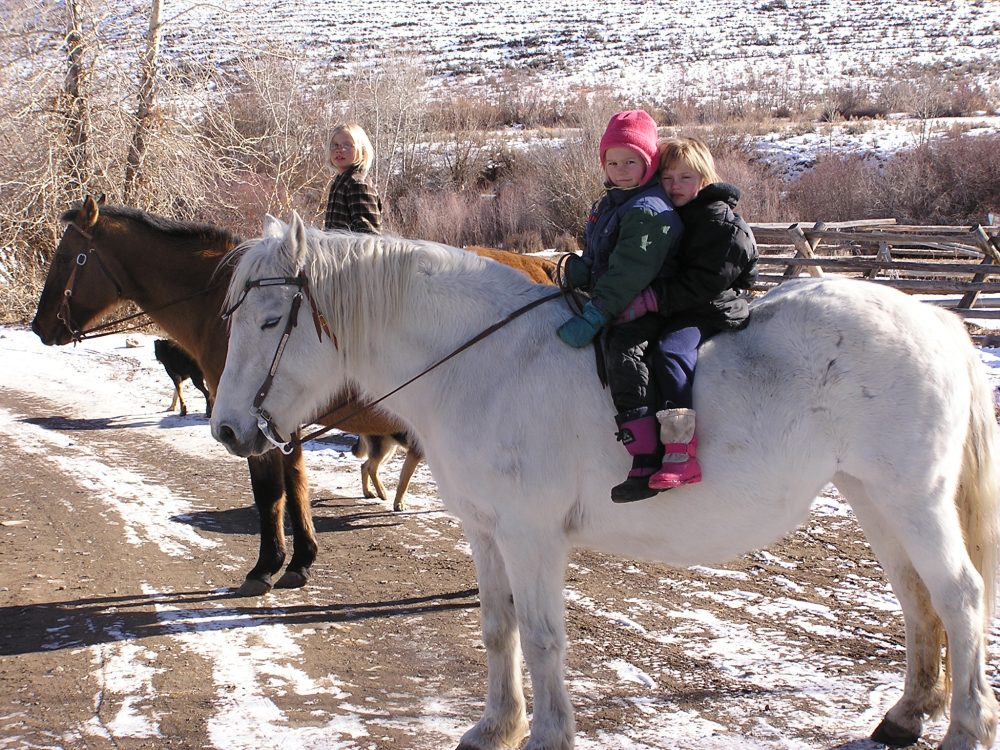
Left to right on a slightly less cold winter day, daughters Abby, Linnaea, and Emily are horseback and bundled up against the cold. Their steeds are Gus (the buckskin) and Bonnie (white). Both of these kind old horses lived into their thirties and patiently taught every single one of the girls to ride.
“It’s cold out there,” I said, looking at Caryl.
“Too cold?”
“No. I don’t think so. It’s all ready.”
Caryl smiled, and waited, rocking while baby Becky finished up her dinner.
Our cow barn was a tiny one, about 12 by 25 feet, made of small lodgepole logs, still with the bark on, notched together in an attempt to block out the cold. I’d spent nights in there with the cows in the subzero, getting the heavy and pregnant Angus girls into a safe place for them to calve. Sometimes, I’d have 12 heavys in there, bodies touching walls and each other like a row of suckling pigs (‘heavy’ means about to calve—soon). I’d sort them out of the snow and drifting wind as black night fell and coerced them to the cover in the shelter of the barn. Calves born in subzero cold would freeze to the ground in 2 minutes, and no matter how hard they tried, would not be able to break the bonds of their wet and frozen fur from the icy ground. I had neighbors that lost calves every year this way. The newborns got hypothermic quickly, and simply faded away, frozen to death on the raw and dirty ice.
I couldn’t handle the thought. Ron, the rancher we bought the place from couldn’t either. So he tried to find all the calvy heavy cows out of the herd, and put them safely in the rough log barn. He showed me how to spot them (his talent for this was uncanny to me, even to this day).
“She’s gonna have a baby tonight, Glenn,” he’d say. And 9 times out of ten, he was right. It was how she carried, how ripe (“springy”) she looked on her back end, and how her ‘bag’ formed up (that’s her udder). “You can see her tailhead drop,” he’d say. And then, soon, like clockwork, that entire tail rose up almost in obedience to Ron. It was cow instinct. Tail with a characteristic kink in it getting out of the way. A baby was coming, after all.
And it did. Beef cow would walk around first with two front hooves sticking out cradling a black Angus nose under a translucent yet pure looking ‘bag of waters’, then, in just minutes, cow would lay down, pushing against an unseen force and produce a steaming pile of fur, jelly and fluids, writhing in the straw. It was always a miracle, and ever will be for me. Ron would grab one clean straw from the golden stems on the barn floor and tickle the newborn’s nose, generating a sneeze, blowing out any excess mucus. “You just gotta get ’em to breathe clear, Glenn. You don’t want that crap going in their lungs.”
He was right. There were almost 70 years of pioneer wisdom in that man, and I soaked it up like a sponge.
When I took over, I did the same cow husbandry Ron did. There was no reason to try anything different; I was finding Ron’s cowboy class of wisdom was worthy of my deepest appreciation and respect. There was no ag school, county agent, or online course that could have prepared me for the lessons of life better than the from the careful coaching of Ron Alder. Sure, he cared about me—or at least put up with me. But I’m thinking he cared about the cows more. He wanted them treated right. “Them girls owe me nothing,” he would say.
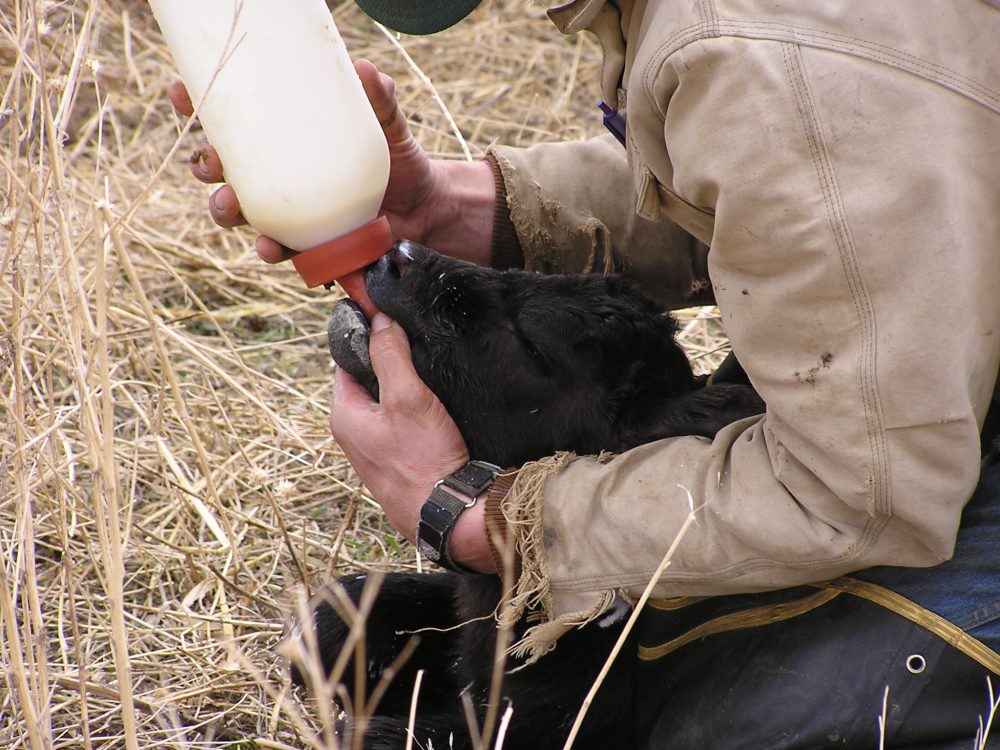
Sometimes when a calf gets too cold, even after warming it up we’d have to “restart the system” with some bottle fed milk before the calf would put in the effort to try and nurse from its mom.
Despite my greenhorn-ness, for one reason or another, the wild range cows trusted me as I checked them through the night, gingerly stepping over them, brushing up against their noses and tails as they lay, albeit a little uneasy, chewing cud. These were the same cows I’d seen roll a dog with their massively strong noses, pounding them relentlessly, dog screaming in terror for simply sniffing at a week-old calf. They’d even rolled me a time or too. Disrespect they did not tolerate.
But yet, here I would be. Close quarters, personal space violating. Ron said it was all about how you acted. It took me awhile to get it, but I was beginning to. The body language of bovine is full of nuance, and I needed to emulate it. I was a slow study, but I was learning. The vapor off their breath and bodies coated the cold logs with icy rime crystals. Their body heat alone raised the temp in the barn from subzero to above freezing, but not by much.
The low log structure had three little stall- like chambers in it, and no electricity. There were abundant nails to hang kerosene lanterns from (we had many). The trick was when you had a cow in the middle of delivering a calf, you had to shuffle all of the mamas around to get the one calving to get enough room to get the job done. And if you needed to assist—well, then, you really had your hands full. But somehow, it always worked, and I think those old girls knew that you were there to help.
But tonight, on this particular night, there were no calves being born. Tonight, they were safely tucked away warm inside their mom’s bellies. They would come in another 45 days. There were only Venus, Juney and 2 barn cats.
Venus and Juney were a pair of beautiful black Nubian milk goats. They were a sort of Godsend to me, personally. I still marvel that we even found them. I heard through the grapevine of our tight-knit valley community that a family up the North Fork, just 50 miles away, was parting ways with them (fifty miles in our sparsely populated county was a close neighbor). It was a tiny family goat dairy, folding down shop—forever. The milkmaids—their teenage daughters–cried as I loaded the sweet and quietly murmuring goats in my carryall. I didn’t know if my plan would even work, but I was in dire straits.
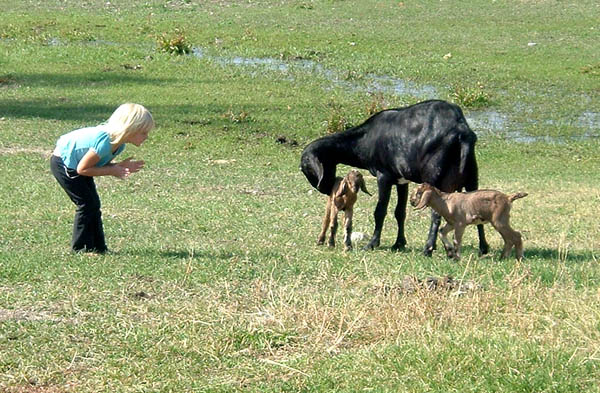
The goat Venus and her babies in the springtime, with a towheaded Abby looking on.
I think I was dying. Docs said it was IBS or Chrohn’s. I was in my early 40s at the time, and my body was crashing. It seemed everything I ate caused absolute rebellion in my gut, and I was ready to try anything. I’d been through dozens of doctors and prescriptions to no avail. The latest pioneer wisdom I discovered to try was to live on just goat milk, wild game (we often harvested elk and deer) and our beef.
And it was working. I finally had my feet under me again. I was so grateful. I was certainly healing up enough for a particularly holy (to me) pilgrimage on this night.
This night was Christmas Eve. As I bundled the kids up in wool shirts and sweaters, and slipped their little boots onto their feet, Caryl wrapped Baby Becky up in blankets. Then, we got out some army surplus wool, and I wrapped the kids with them. I fashioned over each tiny blonde-haired head a hood from the whip-sown edge of the soft wool.
“Where are we going, Dad?,” Melanie, the oldest queried.
“Outside,” I simply said. I reached up to the nail by the back door, and lifted down the hurricane lantern and lit it with my lighter. It was an old kerosene contraption that carefully sheltered a small flame in a globe of glass, even in the wind. It took a little care to get the wick trimmed right, but I at least had that in hand. As I curated the flame, I noticed the roar of the wind against tin had halted. Thank God that the brutal easterly seemed to be finally abating. But I knew from experience what that meant was that the temperatures between the subzero bathtub of Montana and the drain catchment of Idaho had equilibrated.
It was now really cold outside.
Four hooded figures stood by the door wide-eyed, open-mouth speechless. I grabbed my own gray army blanket, and Caryl hers. Under hers snuggled a Baby Becky, half asleep, tummy full, satisfied, warm.
Tucking my head and bracing for cold, I held the door open as our little entourage journeyed out into the darkness. Skeena, happy Husky dog, quietly trotted out of the black into the orb of golden flickering light to join us. Indeed, the wind had abated, and now, only a still breeze coursed over the windpacked white, snaking swirls of snow in the lanternlight around our feet.
“This way, girls. Follow me.”
Our little caravan tracked over and down a small rise through the drifted snow towards the barn. I led, and a height progression of hooded and snow-dusted gnomes followed close behind. Caryl brought up the rearguard, cradling Becky in her arms. It wasn’t far, but for those with little legs on a frozen night, it must have seemed trans-continental. But not a word was spoken on the 100-yard trail I broke and led through the snow. We stopped for a brief second and looked back at our shack—our home. Warm light glowed from the frosted windows, and in the bright starlight, a slow curl of woodsmoke rose, slanting off in the low persistent breeze from the stovepipe. The lights from a Christmas tree graced one window.
And then, silently as we stopped, we started. We needed to keep going. The cold would get us all if we didn’t.
The big barn door creaked on its hinges as I pulled it open over the new drifts of snow. The warm glow of lanternlight coming now from the middle stall worked its way into the doorway. I stood back, and held the door for my tribe of winter-night wayfarers. Four little hooded and snow-coated figures came into the warm glow, wide-eyed with wonder and curiosity. Their beautiful mother came in with her own wool cloak-blanket, with Becky nestled safe and comfortable.
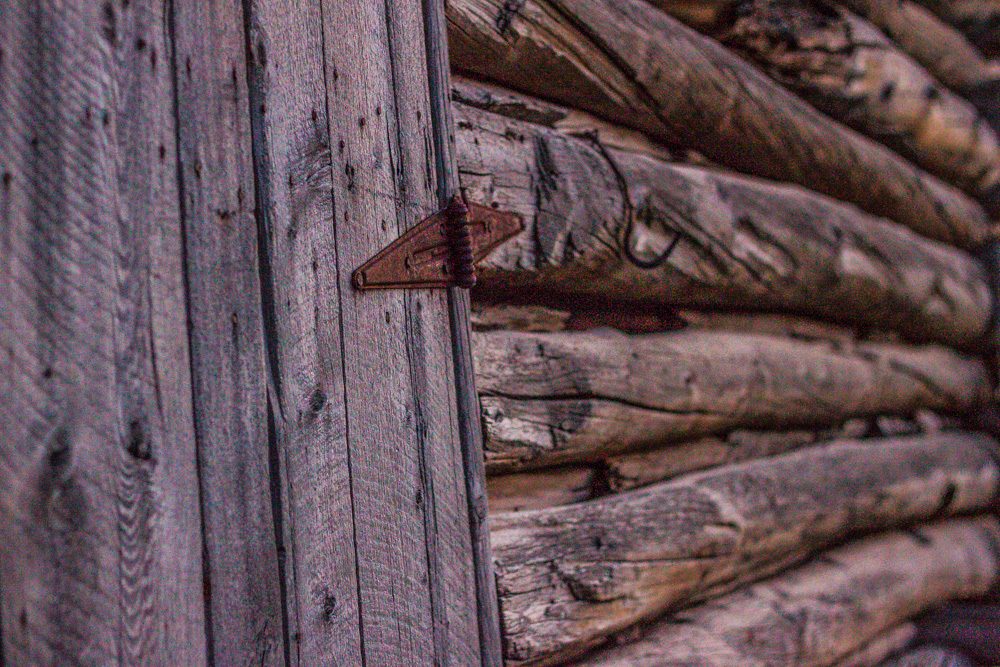
They each made their way in to the lantern-shine. Under 2 yellow-flamed orbs, Juney and Venus laid in the clean and deep straw. The barn felt warm—so much, that we rolled back our hoods. Caryl opened Becky to the view of it all. Baby eyes glowed round and warm in the lanternlight from inside the oven ‘v’ of the blanket shawl.
Unusually quiet kids took it all in—the light, the smell of fresh straw, Juney and Venus, the barn-cats curled in the manger. The quiet. The warmth. We stood for a moment, and then I spoke on the edge of a whisper:
“It was on this winter day, or sometime around it, many years ago, that Jesus came to the world in a place just like this. He was tinier than Baby Becky, and just born, here on the straw, right next to some critters just like Juney and Venus. It wasn’t clean. There were no doctors, nurses or midwives. It was just Mary and Joseph, who came out of the cold to the only place they could find.”
“They would be safe here. Out of the wind. And the animals made it warmer, just like Juney and Venus do. They had to stay here because the innkeeper said the place was full. But then, even as Joseph and Mary were likely turning away fearful and worried, he probably said: “Wait–on second thought—I do have the stable. You are welcome to stay there.”
I pointed to the soft straw that Venus and Juney lay bedded on. “Jesus was most likely born in a place just like that–on the ground just like the calves and goat-kids are in our barn. On a winter night. And Mary, his mom, laid him in a manger, a lot like the one filled with straw that the cats are laying in. And she wrapped him in cloths, maybe wool blankets, just like Becky is in right now.”
“Is this where the shepherds came?,” Abby asked.
“Yes. This is where they found him. In a manger. With the animals. They probably felt very comfortable here, because they’d been living on the range with sheep, goats and dogs. Just like us.”
“And it was like this?” asked Melanie, who was looking at the rough logs, still with dirt-encrusted bark on, contrasted with the latticed and beautiful design of frost on the ceiling and crystalline cobwebs on the beams.
“Yes. I think it was.”
It was and still is the most humble of births for a King. The bringer of hope, peace on earth, and goodwill to men.
Merry Christmas to you all.
Glenn
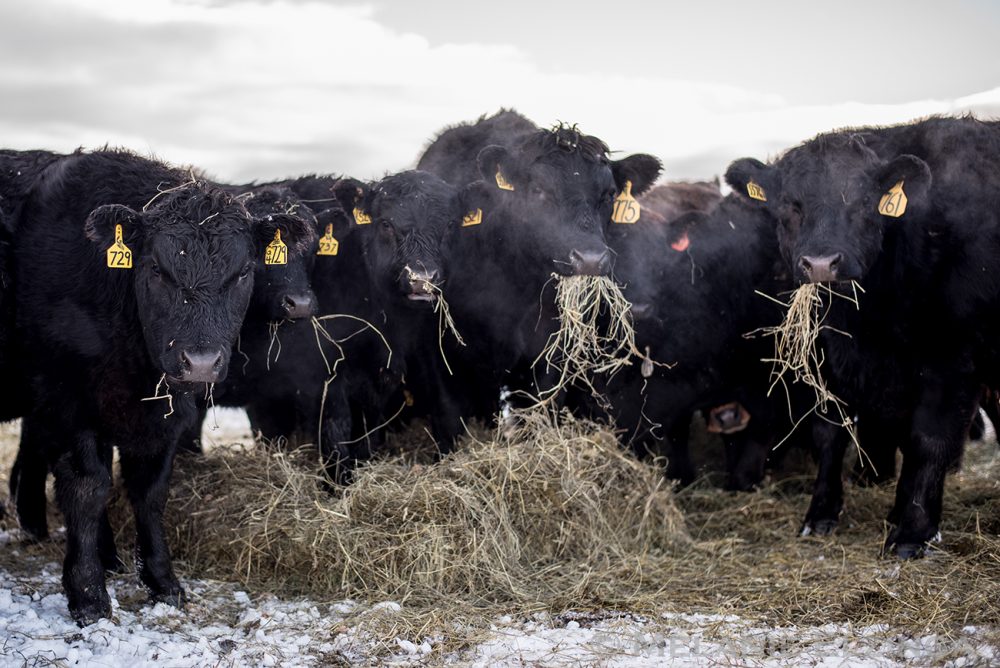

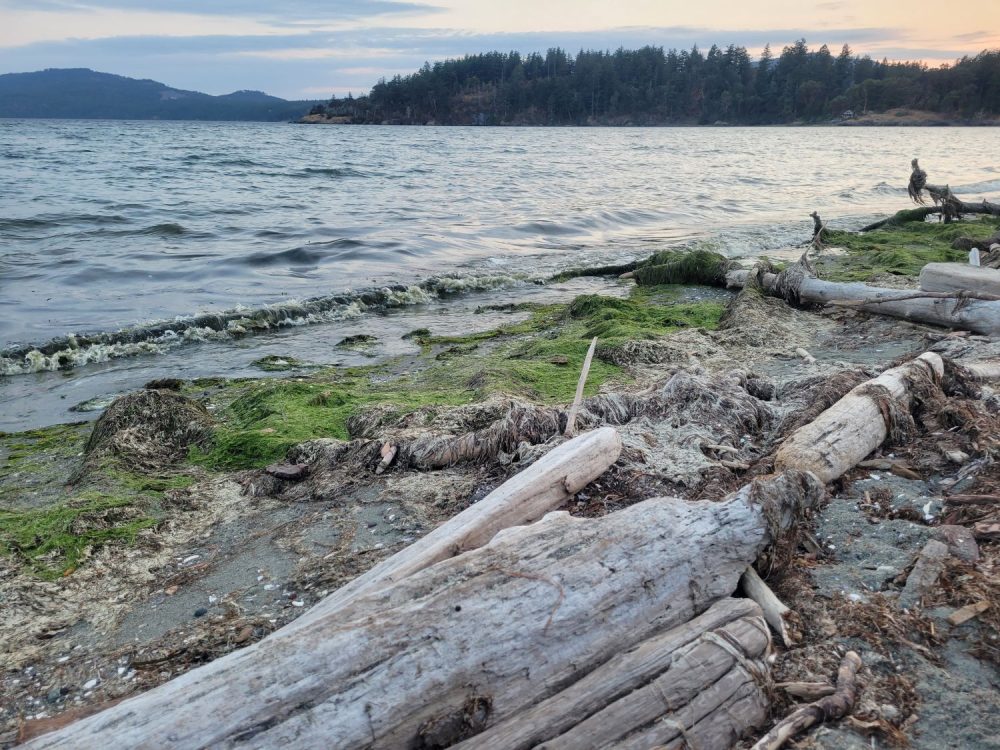
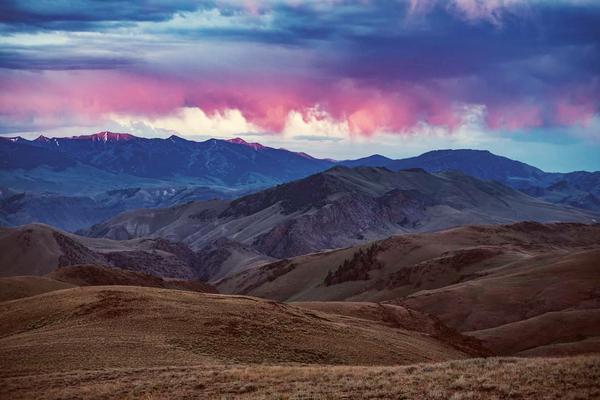




Curt
Thanks for the story. God bless you and your family this Christmas.
Terry
Thank you Glenn for this warm gem of a story. Many blessings to you and your kin!
Terry
Don Catapano
What a beautiful story as all your stories are. I always look forward to reading them.
May God bless you and family. Merry Christmas to all.
Leslie Conner-maiyo
Lovely story from original Alderspring ranch!. So amazing my sister got to spend healing time in the homestead cabin there and restore it! That was truly remarkable, ! Have a beautiful Christmas 🎄 â¤ï¸. Leslie
Erik Storlie
Beautiful story! Thanks Glenn. May the peace and blessings of Jesus of Nazareth cover the earth.
Bob Stone
Wonderful Christmas story Glenn! Many blessings this Christmas to you and your family.
Glenn Elzinga
Thanks for reading, Bob. Hope you had a Merry Christmas as well, and Happy New Year!
Tanya Hecker
I am continually blessed by the stories you share of your life and work in our mountain areas.
Am also very thankful for the high quality beef you offer.
The Lord has truly had his hand on your life and family.
David
MERRY CHRISTMAS and God Bless you all !
Glenn Elzinga
Thank you, David!
Mike S
Wonderful story for one of our most important holidays. Merry Christmas to the whole family.
Glenn Elzinga
Thank you, Mike. Hope you had a Merry Christmas as well!
Robert Douglas
What a beautiful way to bring to life how it happened. I grew up next to the divide in Montana and experienced many of those winter nights on the ranch. My parents also instilled in us the true meaning of Christmas. Blessings to you and your family!
Glenn Elzinga
Beautiful country up there, Robert. Hope you and yours had a Merry Christmas as well!
Sarah Mendiola
I never get tired of reading your posts, Glenn. But this one tops them all. â™¥ï¸ Merry Christmas to you all!
Glenn Elzinga
Thanks so much, Sarah! Hope you had a great Christmas!
Joseph LoPorto
I love this! Thanks for sharing!
Glenn Elzinga
Thank you for reading, Joseph!
Deb Olsen
Words can’t express how your stories touch the deepest part of my soul! You truly are a man of God and although you could have been very successful in writing you chose the hard way of life for all of us and I want to thank you for everything you do. I too suffer from chrohns and an incurable cancer but since being guided to you I do very well now. How hard things must’ve been starting out for you and yet you trusted in God to show you the way and learn everything you could to bring joy to our world just like the birth of our savior. May God be building a special place for you in his kingdom, and I pray your wonderful children will follow in your path always like you did and not cut corners by flipping cows to make a profit. I don’t see that happening though, I’m sure your children are just as special as you are. Thank you again for all that you and your family do and may God bless you all!
Charles Baker
Another beautiful story, Glenn, full of the physical and spiritual beauty that animates your own life and that of your family. So much of America has (permanently?) lost the powerful connection between Man and God’s innumerable creatures–great and small.
A wonderful remembrance of the many lessons we learn in Gods world, from struggle, family, weather and the incredible creatures with whom we share this world.
Thank you.